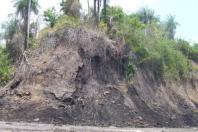Fracking the Occupied Syrian Golan Heights to begin 2015
Golan exploratory oil drilling to begin within the month (January, 2015)
Afek Oil and Gas will begin exploratory drilling for oil in the Golan Heights in the next three to four weeks, after the High Court of Justice threw out a petition on Tuesday from environmentalist group Adam Teva V’Din to stop the oil exploration.
On September 11, the Northern Regional Planning and Building Committee approved a project for the exploratory drilling of ten wells in the Golan Heights. But immediately afterwards, environmentalist group Adam Teva V’Din, along with a number of local residents, filed a petition with the High Court of Justice claiming that Afek did not provide enough information about the methods it will use to extract the oil commercially. Afek countered that the company must first drill to determine the kind of oil in the Golan before it can submit a plan for commercial extraction. On September 30, as Afek began the preparation work for drilling, Adam Teva V’Din petitioned the High Court, which issued an immediate stop work injunction.
On Tuesday, the High Court threw out most of the petition because the current approval from the Planning Committee is for exploratory drilling only, not for commercial production.
However, environmental activists who filled the courtroom on Tuesday left the court encouraged by the judge’s clear delineation of exploratory drilling and commercial production.
“The danger is that [companies] could go directly into the production stage without getting the proper approvals,” explained Leehee Goldenberg, who is the director of the Economy, Environment, and Natural Resources Department at Adam Teva V’Din (also called the Israel Union for Environmental Defense). She noted that the Megged drilling site near Rosh HaAyin is caught in this limbo between exploratory and commercial production. Goldenberg claimed that although the site is not approved to extract oil commercially the site has produced 600,000 barrels of oil since 2011, far exceeding the needs of “exploration.”
Greenpeace and other environmental organizations protest outside the Jerusalem Supreme Court during a hearing on oil drilling in the Golan Heights, on December 23, 2014.
“Today, the judges gave us the possibility to stop production, a clear and obvious way to stop it,” said Goldenberg. “This means that production can’t start until it goes to the Planning Committee, and the Planning Committee will be sure to have all of the additional information about water issues and other environmental problems.” Goldenberg said that they felt confident that the approval from the Planning Committee for commercial drilling would take years, adding significant delays to Afek’s project.
The judges also specified that Afek could produce “limited number” barrels from each well, which the environmentalists chose to interpret as less than 10 barrels per well, though no concrete number was specified.
However, Afek CEO Geoff Rochwarger said the court made no changes to Afek’s original project. “The [High Court] said in essence that what Afek has said and committed is the truth,” he said. “What I see is an affirmation of our research data that we put forward, that what we represented in the beginning is in fact the truth.”
“It’s unfortunate that it took this long, but I’m excited,” he continued. “I’m optimistic that since now we can finally begin the work, with each day we [are working] it brings us closer to finding out finally what kind of oil is there for Israel.”
During the 60-day period of the approval process for the exploration project — when the public could file opposition to the project — activists and Golan residents filed 900 public oppositions to Afek’s drilling plans. The Planning Committee eventually dismissed almost all of them, but the residents are still angry and worried.
“We’re not de facto against the exploration, we’re against drilling,” explained Kinneret Belzer, a resident of Kfar Harov in the Golan. “The problem is, in the past, once they’ve discovered oil, they’ve gone right on to production.”
The Northern Regional Planning and Building Committee approved a project for exploratory drilling in the Golan Heights in 152 square miles, starting in Katzrin and extending southward. This permit area represents about 33% of the 463 square miles that make up the Golan Heights. The area for exploration just delineates areas where Afek has permission to drill, though each well has an average footprint of 1.7 acres.
The exploration program allows Afek to drill 10 wells in order to search for oil, which its experts believe exists in a conventional liquid form and not the oil shale compound. However, they won’t know until they drill. The company is not yet sure what exactly it will find, or even if it will find oil at all. Since Israel’s founding, companies searching for oil across Israel have drilled 530 exploratory wells, and none of them has turned up commercially viable oil, Rochwarger said in September.
Genie Israel is the parent company of Afek, and Rochwarger is the CEO of both Afek and Genie Israel. Genie is also the parent company of Israel Energy Initiatives, which failed in a project denied a pilot program for a controversial new technology to extract oil shale in the Judean lowlands near Beit Shemesh.
Genie Israel is chaired by Howard Jonas, and has some heavyweight investors. Former US vice president Dick Cheney, Michael Steinhardt, Jacob Rothschild, and Rupert Murdoch are all reportedly connected to the company. It also has connections within the Israeli political establishment: The chairman of Genie Israel is Effie Eitam, a former member of Knesset who also served as the minister of national infrastructures in 2002-2003.
Although Tuesday’s hearing took place less than a month after the worst oil spill in Israel’s history, the Arava disaster did not have much impact on Tuesday’s discussion, since the Arava spill came from a pipe transporting oil, which is different from oil drilling. “Even though there is absolutely no connection whatsoever, I was concerned that this would be an opportunity that the general public would misunderstand and try to draw connections,” Rochwarger said.
Afek will start exploratory drilling at a site called Oil 5, which is located next to the town of Avnei Eitan, southwest of two reservoirs and in between two small rivers. For the next few weeks, they will complete the preparation work like building fences around the site.
The drilling at the first site will last two to three months, to a depth of 3,900 to 6,500 feet. If it discovers oil, Afek will use a variety of techniques to remove the oil and explore the possibility of commercial production in that area. Then it will cover the well to remove physical evidence of its existence, and move on to the next exploratory drill site. The exploratory stage is expected to take two to three years.
Afek would then return to the Northern Regional Planning and Building Committee with their plan for commercial production of oil, and the court cases will begin anew.


